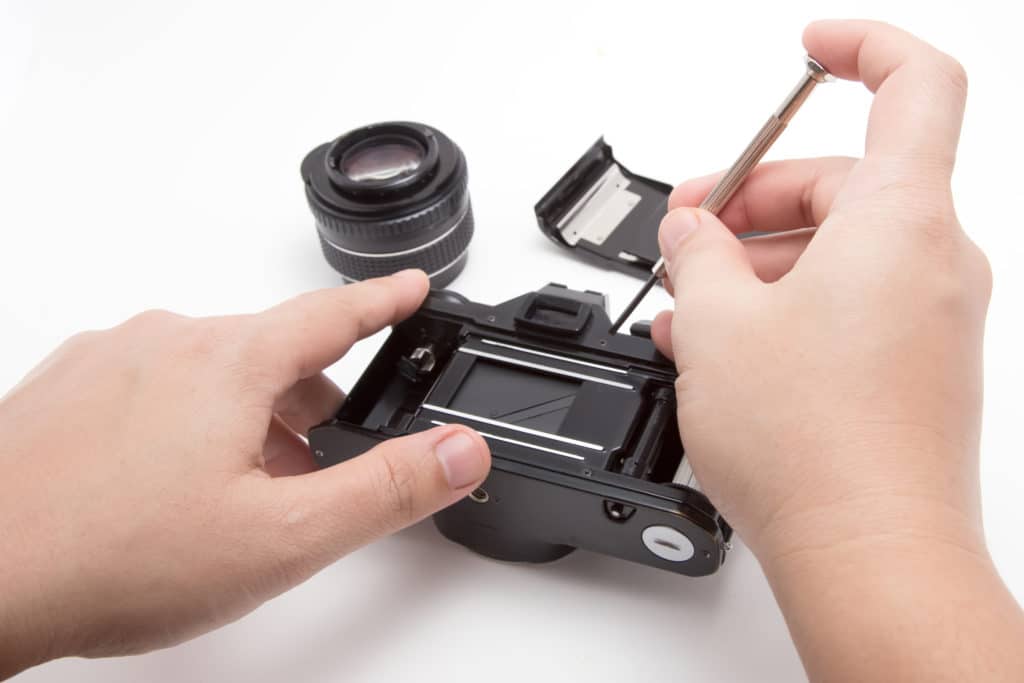Caring for Your Photo Equipment

A passionate photographer is always taking their camera out on the road, on trips, and on walks. This has a price: you sometimes have to think about maintenance a little more. But then, you have to think about it anyway. Sometimes instead of composition and camera settings, you do have to focus on maintenance and camera care. Read on for a few tips on how to do this.
Cleaning Your Camera
Getting gray-black dots on your photos—usually in the same spot—that you have to laboriously retouch away? Dust, sand, or other minor impurities may have gotten onto your sensor. These impurities can damage the fragile shutter mechanism. So every now and then, turn your camera with the lens pointing down and give it a good cleaning with a balloon. But never touch the shutter mechanism or the sensor—you can irreversibly damage it. Also, send your camera in to the shop for a full cleaning once every two years. It won’t hurt.

Protect Your Lens from Scratches and Impurities
When cleaning your camera, don’t forget the lens. Gradually clean its inside and outside to remove fingerprints, as well as dust and dried raindrops. Spread a little cleaner on the lens and then carefully wipe it with a microfiber cloth. But not with your shirt. Those scratch.
And don’t forget to put a cover on your lens when you’re not taking pictures. That prevents many scratches before they happen. Use a UV filter. It is not so much for the UV filtering, but because it prevents scratches and other mechanical damage. Lens hoods, too, provide some impact protection. For more information here, see this earlier Zonerama article.
Don’t Forget the Batteries
I’m sure you’ve seen it. You’ve finally composed your scene, and you’re ready to press the trigger. But the camera doesn’t react. Why? Dead battery.
And because of this, it’s good to always have at least one spare battery along with you. Especially if your camera needs something other than AA or AAA batteries.
Also take some time occasionally to scrub your battery contacts with a pencil eraser. That gets rid of oxidation surfaces. If you’ll be spending a while without taking pictures, don’t forget to remove the batteries from your camera. That prevents corrosion—which is a problem with older battery types especially.

Water: The Humble Terror
Water hurts lenses, but that’s not all. It also damages electronics and moving parts.
Store camera supplies in plastic boxes when you can. That mainly means cards and spare batteries. If you get wet and your photo bag isn’t equipped with a jacket, then go and dry off your photo equipment in a dry environment. Don’t leave it in a wet backpack.
Another thing that you should pay attention to is salt water. Few things are more aggressive towards metals. If you are taking pictures around salt water, then protect your camera with everything available. Use a plastic bag, for example, and leave only the lens peeking out. This protects the lens against unexpected splashes, and against corrosion as well.
Watch Out for Condensation
Condensation vapors form instantly when you go from cold areas to warm. Then the water vapor condenses and you can get a short-circuit, when you turn on a camera that’s “wet” like this. It can even damage your whole camera. So don’t turn on your camera right away in this situation. Give it some time to “get adjusted.”
Clean It to Keep It
Treat your photo equipment with respect and care for it regularly, and it will serve you well for many years. The widespread opinion that if you care for something, it will last, is not just an opinion.
There’s a lot of things you can fix with Zoner Studio, but damaged camera isn’t one of them.

Hedley Grenfell-Banks
Simple advice about caring for digital cameras, with a photo showing advanced maintenance on a film camera. Odd.